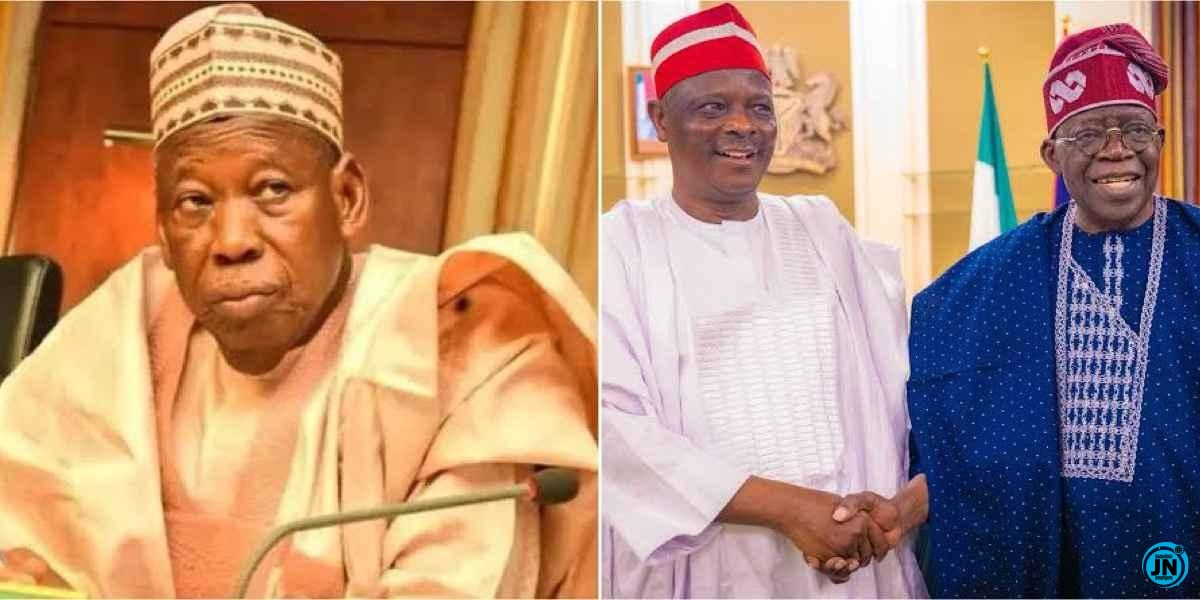
The National Chairman of the All Progressives Congress (APC), Dr. Abdullahi Ganduje, has reportedly stepped down from his position amid mounting controversy over an alleged deal to bring former Kano State Governor, Rabiu Musa Kwankwaso, into the ruling party. The unexpected resignation, which was confirmed by senior party insiders on Friday, has sparked widespread shock and confusion at the APC national headquarters in Abuja, leaving staff, stakeholders, and supporters scrambling for answers and convening emergency meetings to understand the full implications of this high-profile exit.
According to a top APC official who requested anonymity, “Yes, it is true. He has resigned.” This confirmation came as personal belongings were observed being moved out of Ganduje’s office earlier in the day, fueling intense speculation and rumors about his decision to quit. Witnesses described a tense atmosphere within the party headquarters as news of Ganduje’s departure spread rapidly among party members and staffers gathered in groups to discuss the unexpected turn of events.
Sources within the party revealed that desperate efforts were made by senior officials, including National Secretary Ajibola Basiru, to dissuade Ganduje from stepping down. One source stated, “We are currently pleading with him (Ganduje) not to resign. He is deeply upset about Kwankwaso joining the APC. I think the two of them are sworn enemies. All the major stakeholders have been begging him to reconsider and stay.”
Despite these last-minute interventions, the efforts proved futile. “He has eventually resigned. We couldn’t stop him. There is something very personal between him and Kwankwaso, who is now prepared to join the APC after a series of discussions with President Bola Tinubu,” the source added.
The history between Ganduje and Kwankwaso dates back to their time as political allies within the Peoples Democratic Party (PDP). Kwankwaso served as governor of Kano State from 1999 to 2003 and again from 2011 to 2015, with Ganduje serving as his deputy during his second term. However, their relationship deteriorated dramatically after Ganduje succeeded Kwankwaso as governor in 2015 under the APC, leading to a deep-rooted rivalry that has defined Kano State politics in recent years.
The tension escalated further following Ganduje’s controversial removal of Emir Muhammadu Sanusi II, a move widely believed to have been targeted at weakening Kwankwaso’s influence. Sanusi was later reinstated in 2024 by Governor Abba Yusuf of the NNPP, a close ally of Kwankwaso, thereby rekindling old wounds between the two former allies.
While Ganduje officially cited health reasons for his resignation, party insiders and political analysts believe that the internal power struggle and the impending defection of Kwankwaso to the APC were the central factors behind his decision. The reported plan to bring Kwankwaso into the APC fold was seen as a strategic move to consolidate northern support for President Tinubu ahead of the 2027 general elections, but it also meant sacrificing key figures, including Ganduje, to achieve broader party unity.
Adding to the intrigue, Buba Galadima, a close associate of Kwankwaso, denied direct knowledge of any defection plans but acknowledged that discussions had taken place between the presidency and APC leadership about making significant sacrifices to restructure the party. “I am not aware of any defection plan, but I know there was a meeting where they agreed that Ganduje and Vice President Kashim Shettima should be sacrificed to bring new faces into the government,” Galadima revealed.
In reaction to the resignation, Ganduje’s aide, Salihu Yakasai, expressed his disappointment on X (formerly Twitter), posting a cryptic message: “TINUBU WHY, APC WHY,” accompanied by multiple crying emojis, reflecting the frustration and sense of betrayal felt by Ganduje’s loyalists. Former presidential aide Bashir Ahmad also confirmed the resignation via his Facebook page, further solidifying the credibility of the reports.
Following the party’s constitution, Deputy National Chairman (North), Ali Dalori, is expected to step in as acting National Chairman. Sources indicated that top APC leaders met at the Presidential Villa to finalize Dalori’s appointment in an acting capacity and to begin discussions on stabilizing the party ahead of future political battles.
As of the time of this report, the APC National Working Committee had not yet released an official statement addressing the resignation or outlining the next steps. However, the unexpected resignation of Ganduje marks a significant turning point in the party’s internal dynamics and is expected to have far-reaching implications for its future political strategy and leadership structure.

